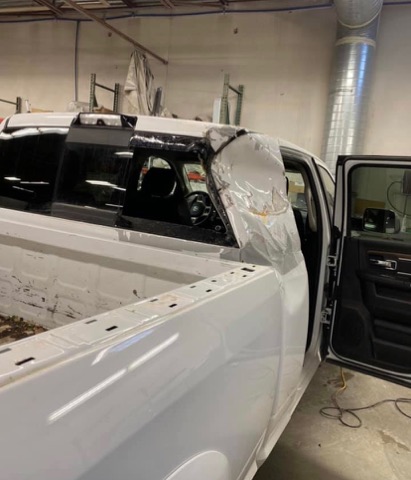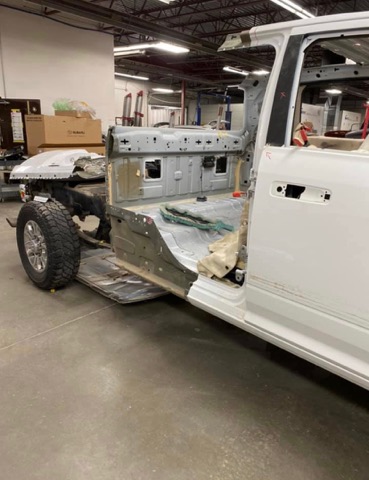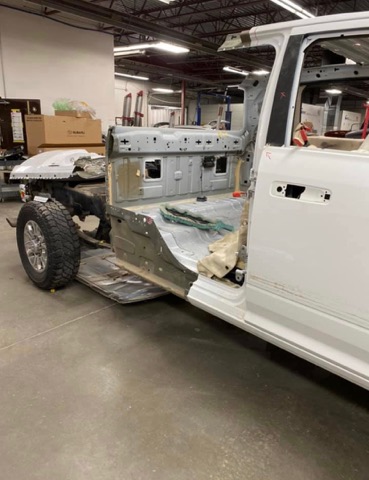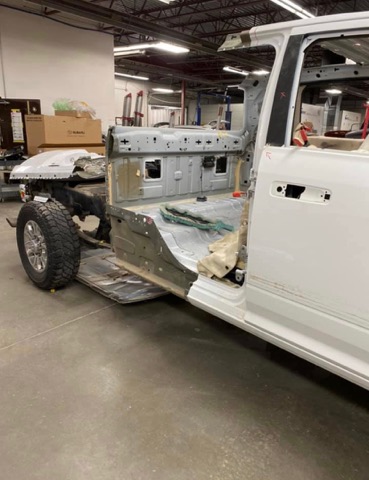The force of being in an auto collision can affect the panels and things that you can see (like fenders and doors). It can also affect areas you don’t see like surrounding panels such as trunk pans and floorboards. On a mild steel car like the ones that were built fifteen years ago or more, you pulled that metal back until it straightened out, or you cut out the damaged part and welded new panels into the vehicle. In the auto body world, this is called a partial part replacement.
Oftentimes, its quicker for a collision repair shop to just cut the whole front or back off the car (depending on where it was hit) and weld in a whole section from a junkyard car, paint it, reassemble it and send you home in it.
Believe it or not, this was a common practice years ago, and worse yet, it still is being done in body shops across the USA.

Chrysler says, stop.
“FCA US LLC strictly prohibits the collision repair process of ‘clipping’, the general practice of clipping would include the sectioning of multiple vehicles at the A-pillar, floor, rocker panel and other locations which contain advanced high-strength steel reinforcements,”
Chrysler is recommending instead for body shops to remove the damaged panel all the way out at the factory seams. This is a bigger workload for the body shop. It includes a lot more labor which means a higher bill to your insurance company.
This is a strongly worded update from the previous position statements that only banned partial part replacement on structural components if Chrysler did not already have a documented procedure for that particular repair.
“Unless partial replacement procedures are documented in an FCA US LLC publication, structural panels must be installed in their entirety; partial replacement or ‘sectioning’ of panels may compromise vehicle structure,” the new position statement states.
Basically, if your body shop cuts out a damaged section rather than replacing the part all the way at the factory seams, it could put your safety at risk because the structure of the vehicle could be weakened.

Why does this matter to you?
Since 2008, vehicles have been built with a variety of steels, including the new high strength steel and ultra high strength steel. Unlike mild steel used in vehicles prior to 2008, these new steels react differently to heat, and if they get bent and straightened, they can crack or become “work hardened.”
Chrysler also refuses to allow for the use of LKQ or salvage parts to be used in their repairs. Here are Chrysler’s own words:
• FCA US LLC does not support the use or reuse of any structural component which has been removed from a vehicle previously damaged, flooded, burned, scraped or removed from use for any other reason commonly referred to as “salvage parts.”
• While some salvage parts may “appear” equivalent, there can be dramatic differences in the design and functional characteristics that cannot be determined by visual inspection and which could have a negative effect on the vehicle occupants in a future collision event.
• Salvage components may have been affected by crash impact loads, incorrect, improper or inadequate disassembly and removal procedures, weathering, or environmental exposure outside of that expected during normal use.
• Salvage components are not traceable should a component recall be required in the future.
“Many factors can influence the integrity and quality of salvage parts including but not limited to weather, previous damage, improper removal or transfer of parts,” FCA wrote in the Nov. 20, 2019, salvage, and recycled parts position statement. “Because of this, FCA US LLC does NOT approve the use of salvage or recycled parts in the event that collision repairs are necessary.”

Basically, any parts used from a junkyard car come with a questionable history and could have prior collision damage, rust issues, or exposure to elements while in the junkyard, and they are banned from Chrysler repairs.
Body shops looking to cut corners may ignore these warnings from Chrysler, but we do not here at Starr Collision. Some auto body shops may use salvage parts because the insurance company insists on their usage. Even though we work with all insurance companies, and some insurance companies may insist on having us do partial part replacements, we do not perform those on Chrysler, Dodge, Jeep, or RAM vehicles as a business decision. We advocate for our customers to get the best, safest, and quickest repair possible. If you have any collision repair needs to your Chrysler Dodge Ram or Jeep, click the button below to schedule an appointment.



